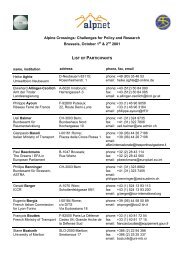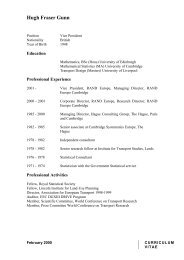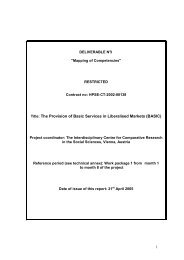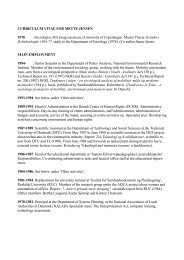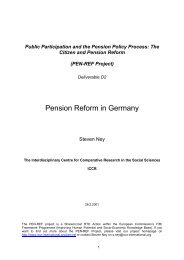The Housing Dimension of Welfare Reform - the ICCR
The Housing Dimension of Welfare Reform - the ICCR
The Housing Dimension of Welfare Reform - the ICCR
You also want an ePaper? Increase the reach of your titles
YUMPU automatically turns print PDFs into web optimized ePapers that Google loves.
integration, however not a guarantee in itself for independent living.<br />
Having a job and earning one’s living is ra<strong>the</strong>r <strong>the</strong> decisive step in this<br />
latter regard.<br />
Considering <strong>the</strong> above, <strong>the</strong>re is a strong need for providing social support<br />
after re-housing has taken place. It is necessary to support both formal<br />
and informal forms <strong>of</strong> cooperation between housing services and o<strong>the</strong>r<br />
specialized services (in <strong>the</strong> fields <strong>of</strong> education, training and employment,<br />
addiction, mental and physical health).<br />
Multidimensional support can be provided in ‘integrated packages’ or<br />
through more flexible and more ‘sectoral’ interventions with priorities for<br />
special areas (e.g. housing) and additional help where needed for o<strong>the</strong>r<br />
dimensions <strong>of</strong> reintegration (health, employment, social relations). <strong>The</strong>re<br />
is no a priori preference for ei<strong>the</strong>r approach as long as <strong>the</strong>re is a<br />
conceptual and, where relevant, operational linkage <strong>of</strong> objectives,<br />
programmes and services – across organisations if necessary.<br />
<strong>The</strong> staircase model<br />
One debate <strong>of</strong> particular importance regarding homeless policies, in<br />
particular, concerns <strong>the</strong> question to what extent it may be legitimate to<br />
refuse homeless people with problems such as alcoholism or drug<br />
addiction, support with gaining access to normal housing or to condition<br />
such access on <strong>the</strong> accomplishment <strong>of</strong> different stages <strong>of</strong> re-integration<br />
and probation periods in special accommodation.<br />
Strongly integrated packages <strong>of</strong> social support including rigid<br />
supervision regimes following <strong>the</strong> so-called ‘staircase model’ <strong>of</strong><br />
integration should be restricted to those who face severe forms <strong>of</strong><br />
marginalisation in conjunction with chronic health or mental problems.<br />
Even in <strong>the</strong>se cases <strong>the</strong>y should be limited in terms <strong>of</strong> time to <strong>the</strong> greatest<br />
extent possible.<br />
In general, self-sustained permanent housing is to be preferred as<br />
compared to transitory and/or collective housing, even if <strong>the</strong> latter is<br />
sensible for a certain period <strong>of</strong> time and for specific risk groups.<br />
Personal support with re-socialisation<br />
In order to re-integrate marginalized persons, material support, like<br />
access to housing, financial assistance as well as support with finding a<br />
job or training, is essential but not sufficient. Personal support is equally<br />
important, and even indispensable for those with severe marginalization<br />
experiences. Personal support should encourage motivation and a sense<br />
<strong>of</strong> responsibility and help in withstanding crisis situations. Emotional<br />
support is <strong>of</strong> particular importance in <strong>the</strong> light <strong>of</strong> <strong>the</strong> widespread social<br />
EUROHOME-IMPACT FINAL REPORT 56



